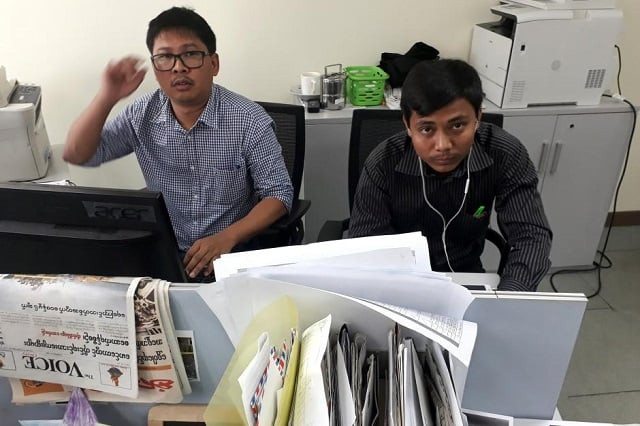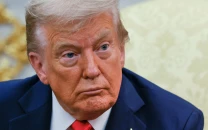UN chief says arrest of Reuters journalists shows erosion of press freedom in Myanmar
Guterres said the international community should do everything possible to secure the journalists' release

Reuters journalists Wa Lone (L) and Kyaw Soe Oo, who are based in Myanmar, pose for a picture at the Reuters office in Yangon, Myanmar December 11, 2017.
PHOTO: REUTERS
Guterres said his main concern over Myanmar was the "dramatic violations of human rights" during a military crackdown in Rakhine state that forced more than 600,000 Rohingya Muslims to flee the country for southern Bangladesh, and the arrest of the journalists was probably related.
Reporters arrested in Myanmar for writing about military crackdown on Rohinga Muslims
"It is clearly a concern in relation to the erosion of press freedom in the country," he told a news conference in Tokyo, referring to the detention of Wa Lone and Kyaw Soe Oo, who had been working on stories about the strife in Rakhine State. "And probably the reason why these journalists were arrested is because they were reporting on what they have seen in relation to this massive human tragedy," he added.
Myanmar's Ministry of Information said in a statement on Wednesday that the Reuters journalists and two policemen faced charges under the British colonial-era Official Secrets Act. The 1923 law carries a maximum prison sentence of 14 years.
The reporters "illegally acquired information with the intention to share it with foreign media," said the statement, which was accompanied by a photo of the two reporters in handcuffs. In a statement, Reuters President and Editor-in-Chief Stephen J. Adler said on Wednesday: "We are outraged by this blatant attack on press freedom. We call for authorities to release them immediately."
US urges Cambodia to reverse steps against democracy
The Rohingya refugees in Bangladesh say their exodus from the mainly Buddhist nation was triggered by a military counter-offensive in response to Rohingya militant attacks on security forces in Rakhine state at the end of August. The United Nations has branded the military's campaign "a textbook example of ethnic cleansing" of the minority Rohingya.
Guterres said the international community should do everything possible to secure the journalists' release and freedom of the press in Myanmar. He called for aid to be delivered, violence contained and reconciliation promoted in Rakhine state, and for the Rohingyas' right of return to be fully respected and implemented.



















COMMENTS
Comments are moderated and generally will be posted if they are on-topic and not abusive.
For more information, please see our Comments FAQ